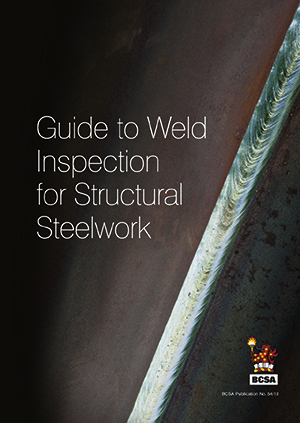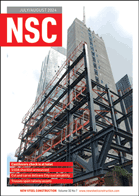Technical
This way to CE Marking
The BCSA outlines the measures which must be undertaken to fulfill the requirements of BS EN 1090-1, that allows companies to CE Mark its structural steelwork.
The new European standard for the CE Marking of structural steelwork, BS EN 1090-1, is expected to come into force in May next year. Once in place steelwork contractors in all European Union member states will be able to CE Mark their fabricated steelwork.
While CE Marking will not be enforced immediately in the UK and the Republic of Ireland (ROI), it is likely to become a legal mandatory requirement in 2012. To support steelwork contractors and ensure that they are fully prepared, BCSA has produced a series of guidance notes and a comprehensive publication outlining the requirements for CE Marking.
All of the BCSA’s guidance is aimed at providing steelwork contractors with practical advice on the routes to achieving a certified Factory Production Control system by which they can declare conformity with the requirements of BS EN 1090-1, and, as a consequence, CE Mark structural steelwork produced in their factories.
Factory Production Control system
BS EN 1090-1 defines the manufacturing controls required to ensure that structural steel components meet a range of clearly set-out technical requirements relevant to the manufacture of steel components. In particular, it requires a steelwork contractor to implement and maintain a ‘certified’ Factory Production Control (FPC) system.
An FPC system for structural steelwork is similar to a BS EN ISO 9001 Quality Management System (QMS), with the exception that incorporated within it the steelwork contractor is required to have a documented Welding Quality Management System (WQMS). A nominated a person responsible for all welding activities – a Responsible Welding Coordinator (RWC) – is also required.
Welding Quality Management System
To satisfy the manufacturing controls of BS EN 1090-1, a steelwork contractor is also required to demonstrate that its steelwork meets the technical requirements of BS EN 1090-2, the fabrication standard for CE Marking.
This requires the steelwork contractor to implement and maintain a documented Welding Quality Management System (WQMS) in accordance with the relevant part of BS EN ISO 3834. The relevant part, and consequently the stringency of requirements, is determined by the Execution Class (EXC) declared by the steelwork contractor for its fabricated steelwork.
Execution Class
Specification of an Execution Class (EXC) for steel structures is a new concept within the steel construction industry. In BS EN 1090-2 these range from EXC1 to EXC4, and the strictness of requirements increases correspondingly from 1 to 4.
The choice of EXC is a design issue where each class is based on the criticality of a structure in terms of its service conditions and the consequence of its failure. However, while the designer is responsible for determining the required EXC, to enable CE Marking of its fabricated steelwork, a steelwork contractor must declare and demonstrate its capability to produce a structure that will conform to a specified EXC.
The importance of a steelwork contractor declaring the correct EXC for its range of fabricated steelwork cannot be overstated since this not only impacts on the systems and competency of personnel used to implement and control its manufacturing operations but also the work to be tendered for in the future. A steelwork contractor declaring conformance to a particular EXC can undertake work in a lower class but not to a higher class.
Responsible Welding Coordinator
The term Responsible Welding Coordinator (RWC) is used to identify the person who is competent to control and supervise a steelwork contractor’s welding activities. A steelwork contractor should nominate at least one RWC with the technical knowledge and experience appropriate for the range of fabricated steelwork being manufactured.
BS EN 1090-2 sets out the technical knowledge requirements for the RWC based on the steelwork contractor’s declared EXC, the welding processes and materials used. It makes reference to the International Standard for Welding Cordination (BS EN ISO 14731) which specifies three categories of technical knowledge ie: Comprehensive, Specific and Basic, and links these respectively to International Welding Engineer (IWE), International Welding Technologist (IWT) and International Welding Specialist (IWS).
BCSA has recognised the difficulty in finding formally qualified IWS, IWT or IWE personnel, particularly for those steelwork contractors working solely on buildings. The BCSA is offering its members an alternative RWC training and assessment route for their direct employees. Using a direct employee as the RWC is the preferred option, however, this may not always be possible and BCSA recommends that where subcontractor personnel are engaged they should hold the appropriate IWE, IWT or IWS qualification.
BCSA Members’ Training and Assessment Route
The BCSA training and assessment route is aimed at providing skilled and experienced personnel with the technical knowledge required to undertake the role of the RWC. This route is limited to BCSA members and their direct employees only; it is aimed at those steelwork contractors working primarily in the Buildings sector wishing to declare CE Marking conformance to Execution Class 2.
The route requires the steelwork contractor to propose an employee who it considers suitable to fulfil the RWC role. The candidate is then required to complete and submit an authenticated CV to the BCSA for review, attend and successfully complete the BCSA RWC training course which last two days.
“The candidate then returns to the workplace to develop and implement an appropriate WQMS and following a six month implementation period we would then carry out a factory assessment of both the RWC and WQMS to demonstrate RWC competency and readiness for a FPC pre-assessment by the Steel Construction Certification Scheme (SCCS),” says Dr David Moore BCSA Director of Engineering. “This tests the candidate’s knowledge gleaned from the course and competency at work.”
The Steel Construction Certification Scheme
The Steel Construction Certification Scheme (SCCS) is the certification body specifically for companies engaged in design, manufacture and erection of structural steelwork and its associated products and services. The scheme’s objective is to secure high standards of excellence and quality of processes and associated construction procedures and practices through independent certification.
SCCS is a UKAS accredited notified body for the assessment of factory production control systems, ie: those required for CE Marking of structural steelwork.
For those BCSA members who currently have their BS EN ISO 9001 QMS certification with SCCS, SCCS is proposing to substitute a QMS surveillance visit with an FPC visit. SCCS is also exploring how best to alternate surveillance visits to minimise costs, while maintaining the effectiveness and accreditation of both systems.













